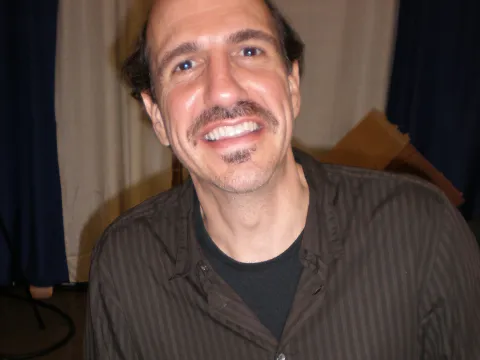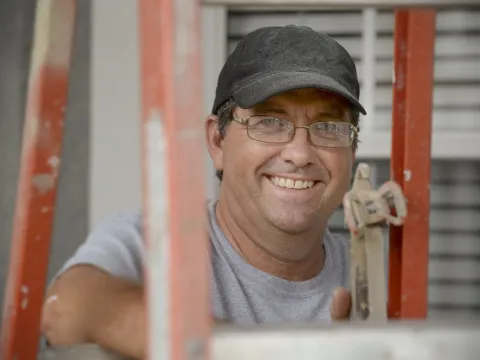- AdventHealth

Whether a loved one or someone that you’ve come to know as a TV personality — like the “Scrubs” star Sam Lloyd — receives an advanced-stage lung cancer diagnosis, it’s only natural to take a long pause, feeling the weight of a heavy heart. But what you do next defines your path. Will you choose hope over fear? Action over resignation? Compassion over indifference?
Hope. Action. Compassion. That’s the direction chosen by expert lung cancer specialists at the AdventHealth Cancer Institute, including Mark Socinski, MD, a board-certified, fellowship-trained medical oncologist specializing in all thoracic malignancies, including lung cancers.
Dr. Socinski explains how advancements in cancer treatments and the fervent push to more personalized medicine is prolonging and improving the quality of life for many Americans faced with a late-stage lung cancer diagnosis.
How Lung Cancer Becomes Advanced Stage
“Historically, lung cancer is a disease that has not been screened for, so patients were not diagnosed until symptoms surfaced, such as cough, shortness of breath and chest pain, which often do not appear until late-stage disease,” explains Dr. Socinski.
Of the 225,000 new cases of lung cancer diagnosed each year in the United States, about 50 percent are diagnosed with stage 4 cancer.
“But today, we do have recommended screenings for lung cancer. And it’s our hope that with more people adopting lung cancer screening, we will be able to identify those who are more likely to have early stage disease so we can treat it with better outcomes.”
According to the American Cancer Society, annual lung cancer screening with a low-dose CT scan (LDCT) is recommended for those who meet all of these conditions:
- Are aged 55 to 74 years and in fairly good health
- Currently smoke or have quit within the past 15 years
- Have at least a 30-pack-year smoking history (30-pack-year means smoking 1 pack of cigarettes a day for 30 years, or equivalent (2 packs a day for 15 years, 3 packs a day for 10 years, etc.).
- If a current smoker, receive smoking cessation counseling
- Are educated about the benefits, limitations, and harms of screening
- Have access to a high-volume, high quality lung cancer screening and treatment center
“Now that we have clearer recommendation guidelines, the next step is increasing the percentage of eligible people that get screened,” Dr. Socinski notes.
Understanding the Advanced Stage Diagnosis and Treatment Options
Dr. Socinski explains that “When we say “advanced stage” in general terms, it refers to stage 4 disease, which has metastasized or spread to other parts of the body.”
Dr. Socinski continues, “When I speak or teach on this, I emphasize that there are two things that you have to get right for each patient in order to personalize the right treatment. First, we have to look at the tumor’s cells and determine if it’s small or non-small cell cancer, and then if it’s squamous or non-squamous. And the vast majority of non-squamous lung cancers are adenocarcinoma.”
Dr. Socinski explains that for adenocarcinomas, it’s important to do genetic testing because there are some DNA mutations that can qualify patients for targeted lung cancer therapies. Many of these therapies — which are taken in pill form — have been proven to be much more effective in treating advanced lung cancer compared to chemotherapy.
“For those that might not have genetic markers that would make targeted therapies an option, we test for the immunotherapy marker called the PD-L1 status of the tumor,” Dr. Socinski states.
If positive for PD-L1, patients may qualify for immunotherapy. For some, chemotherapy combined with immunotherapy can be an effective treatment option.
“All of these paradigms offer hope in that many people with advanced lung cancer can live longer and better. These treatments are proven to control and shrink cancer, relieve cancer related symptoms and prolong life with a higher quality of life, too,” emphasizes Dr. Socinski.
He adds, “With these tests and treatments, we’re doing personalized medicine to a certain degree but it’s our hope to do even better.”
Improving Lung Cancer Outcomes with Research
“We currently have many clinical trials to test treatments for late stage lung cancer that have been built on the results that we have established thus far – new immunotherapy, new (and more effective) oral pills — we’ve created a vast number of options for patients that are far better than in the past,” Dr. Socinski shares.
He adds, “We’re looking at why tumors respond to certain treatments, and why they may adopt a pattern of resistance. If we can find out why a treatment stops working and what changes the tumor is undergoing to create a sensitivity vs. a resistance, we can shed light on new treatments that are more effective.”
Your Path Toward Hope: Dr. Socinski’s Messages to You
It’s a fact: Cancer screenings save lives.
Dr. Socinski starts with this important call to action. “Find out if you are at risk for lung cancer and if you qualify for lung cancer screenings. Talk to your primary care physician or specialist and understand if these screenings should be a part of your routine preventive measures.”
We know more about lung cancer than ever before.
“Today’s lung cancer is not your grandfather’s lung cancer. I say that because we have learned so much about these different subset of lung cancers and we can test for them to create a more personalized treatment plan for each patient. With this, we’re seeing improved outcomes of people living longer and better.”
Anyone can get lung cancer (not just smokers).
“Fewer than 10 percent of lifetime smokers get lung cancer, so there are 30,000 Americans each year that get lung cancer who have never smoked. Lung cancer is relatively common and people need to understand that those who don’t smoke may still be at risk for this disease.”
If you do have lung cancer, trust the treatment team that will “get to know your cancer.”
“With more customized treatment options for lung cancer, it’s important for patients to know that they have a right to more hope because it exists. Trust an oncologist and team that will study and find out all that they can about your tumor, because it’s the nuances and subsets of a cancer that can direct a different course of treatment that could bring more optimism and better outcomes.”
Learn more about the AdventHealth Cancer Institute’s advanced lung cancer treatment options.



